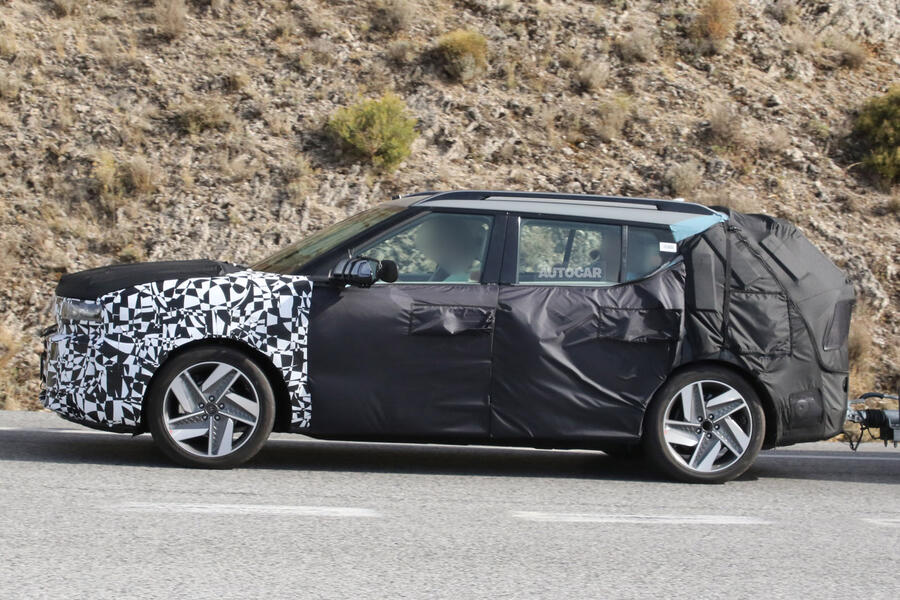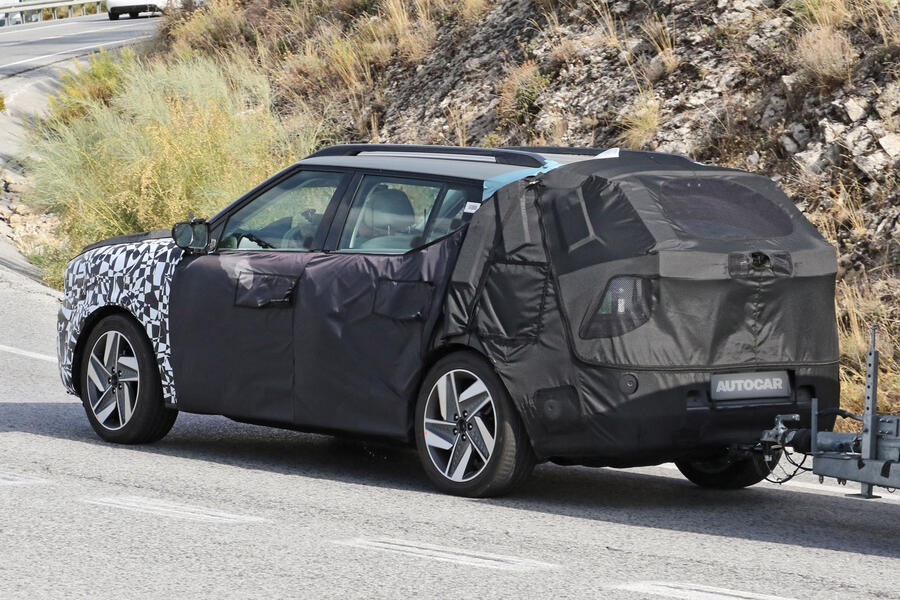New fuel-cell SUV is due next year as Korean firm faces "chicken-and-egg issue" with hydrogen cars
Hyundai is preparing to radically reinvent its hydrogen-fuelled Nexo SUV for a second generation as it doubles down on the viability of fuel cell powertrains.
A prototype for the new FCEV has been spotted testing on public roads in Europe, revealing it to be a radical departure from the styling of the existing model.
It follows in the footsteps of the combustion-engined Santa Fe in becoming much boxier, with a bluff front end and pixel-like headlights. It sits closer to the ground, however, and lacks its bigger sibling’s swollen arches.
This prototype is missing its rear light housings, but others have been spotted in Korea with distinctive plus-shaped covers.
Under the skin, the Mk2 Nexo is expected to represent a significant upgrade on the original. That car features three 52-litre hydrogen tanks, a 95kW fuel cell stack and a 1.56kWh battery, yielding a range of 414 miles between fill-ups.
As previously reported by Autocar, the stack will be replaced by a new 100kW unit that's some 30% smaller and will last 50-100% longer. Hyundai claimed the old stack was capable of 5000 hours or 100,000 miles of use.
Other updates – likely to comprise a more efficient battery and motor – will also help in boosting the Nexo’s range to the 500-mile figure reported by Korean media.
Range will be instrumental in the Nexo’s success, given the limited number of hydrogen filling stations across the globe. In the UK, just six stations are currently operational.
Affordability will also be a key consideration: the current Nexo's £69,495 price tag makes it the most expensive model in Hyundai’s line-up, ultimately limiting its appeal.
Fewer than 50 Nexos have been sold since it arrived in the UK five years ago and fewer than 10 have been sold over the past two years.Â

Nonetheless, the Mk2 Nexo is likely to come here, as Hyundai positions itself as a trailblazer for FCEVs.
Speaking at the company’s recent investor day, president and CEO Jaehoon Chang described it as a “chicken-and-egg issueâ€, comparing the industry’s mood to that around early electric cars.
He said: “We’re going to pioneer the uptake and lead the market. The market requires investment. Thirty years ago, when BEVs were launched, the same issues were mentioned: cost, where to charge and [whether it makes sense].â€
To that end, the Mk2 Nexo will enter production next year, and Hyundai has strongly hinted that it will be followed by a road-going version of the N Vision 74 coupé concept that it unveiled two years ago.
The company is also working on several methods of hydrogen production, including manufacturing the element using waste biomass and plastics.

Hyundai isn't alone in having made strong commitments to hydrogen cars.Â
Toyota, which has historically been the loudest proponent of FCEVs, is currently trialling a fleet of 10 converted Hiluxes in the UK. It also plans to enter the Le Mans 24 Hours' future hydrogen-combustion class.
Its powertrains will also be used by BMW, which recently announced that it will launch its first mass-produced FCEV in four years. “It will herald an era of significant demand for fuel cell electric vehicles,†said BMW chairman Oliver Zipse.Â
The Renault Group and Stellantis, meanwhile, are in the process of rolling out FCEVÂ vans. Renault will launch a new Master H2 next year, offering various bodystyles and a 435-mile range between fill-ups.



